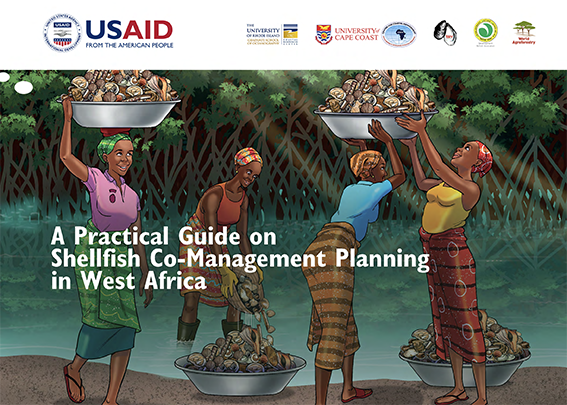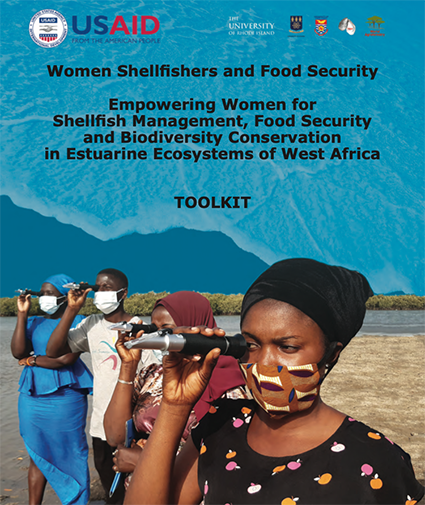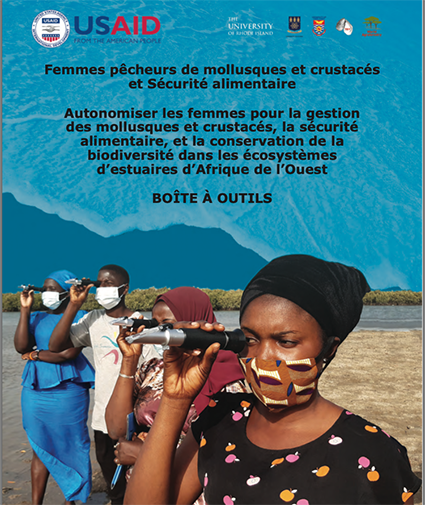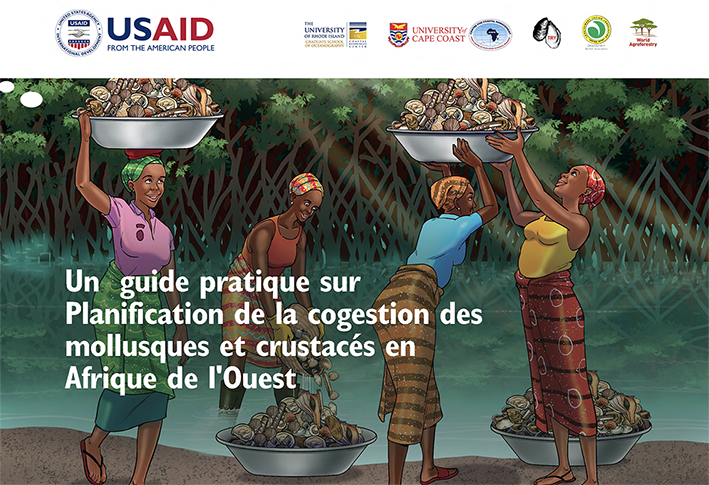Country
Profiles
Country
Networks
Country
Associations

A Practical Guide on Shellfish Co-Management Planning in West Africa [ENGLISH]
This booklet is designed to provide practical guidelines on the steps for the planning of co-management in the Shellfisheries of West Africa. It is an illustrative version of a comprehensive toolkit "Empowering Women for Shelfish Management, Food Security and Biodiversity Conservation in Estuarine Ecosystems of West Africa" developed under the first Phase of the Women Shellfishers and Food Security Project. Find the toolkit online at https://pdf.usaid.gov/pdf_docs/PA00ZHT6.pdf.
on Jan 2024

Empowering Women for Shellfish Management, Food Security and Biodiversity Conservation in Estuarine Ecosystems of West Africa [ENGLISH]
This toolkit responds to an urgent need to facilitate locally driven and locally based livelihoods that enhance rather than degrade natural resources management, benefit women, and engage them in decision making. Coastal estuarine and mangrove areas of West Africa are endowed with a rich biodiversity that serves various ecosystem functions. These include climate change adaptation and mitigation, as well as food security, via the harvest of many estuarine species. Shellfish species comprise a significant portion of the food resources harvested from these ecosystems. As a result, the livelihoods of many coastal inhabitants, particularly women, are closely associated with these systems. Bivalve shellfisheries, primarily cockles and oysters, are the most important to women in West Africa. These livelihoods largely fall within the small-scale fisheries sector, but often go unnoticed in official fisheries statistics, both in volume and value of these harvests. The USAID Women Shellfishers and Food Security project has provided, for the first time, a regional perspective of estuarine and mangrove ecosystem-based shellfisheries in a report titled, “The Estuarine and Mangrove Ecosystem-Based Shellfisheries of West Africa: Spotlighting Women-Led Fisheries Livelihoods” (Chuku, et. al., 2021).
on Jun 2022

Empowering Women for Shellfish Management, Food Security and Biodiversity Conservation in Estuarine Ecosystems of West Africa [FRENCH]
This toolkit responds to an urgent need to facilitate locally driven and locally based livelihoods that enhance rather than degrade natural resources management, benefit women, and engage them in decision making. Coastal estuarine and mangrove areas of West Africa are endowed with a rich biodiversity that serves various ecosystem functions. These include climate change adaptation and mitigation, as well as food security, via the harvest of many estuarine species. Shellfish species comprise a significant portion of the food resources harvested from these ecosystems. As a result, the livelihoods of many coastal inhabitants, particularly women, are closely associated with these systems. Bivalve shellfisheries, primarily cockles and oysters, are the most important to women in West Africa. These livelihoods largely fall within the small-scale fisheries sector, but often go unnoticed in official fisheries statistics, both in volume and value of these harvests. The USAID Women Shellfishers and Food Security project has provided, for the first time, a regional perspective of estuarine and mangrove ecosystem-based shellfisheries in a report titled, “The Estuarine and Mangrove Ecosystem-Based Shellfisheries of West Africa: Spotlighting Women-Led Fisheries Livelihoods” (Chuku, et. al., 2021).
on Jun 2022

Un guide pratique sur Planification de la cogestion des mollusques et crustacés en Afrique de l'Ouest [FRENCH]
Cette brochure est conçue pour fournir des lignes directrices pratiques sur les étapes de planification de la cogestion des pêcheries de mollusques e t crustacés d'Afrique de l'Ouest. Il s'agit d'une version illustrative d'une boîte à outils complète "Autonomiser les femmes pour la gestion des mollusques et crustacés, la sécurité alimentaire, et la conservation de la biodiversité dans les écosystèmes d'estuaires d'Afrique de l'Ouest" développé dans el cadre de la première phase du projet Femmes pêcheurs de mollusques et crustacés et sécurité alimentaire. Retrouvez la boîte à outils en ligne sur https://pdf.usaid.gov/pdf_docs/PA00ZHT6.pdf.
on Jun 2023
